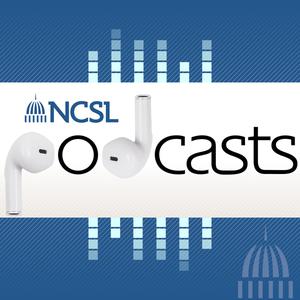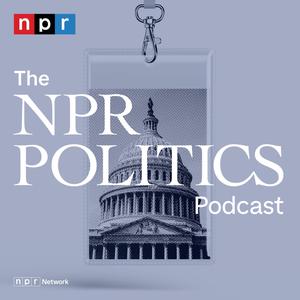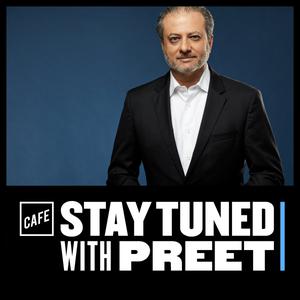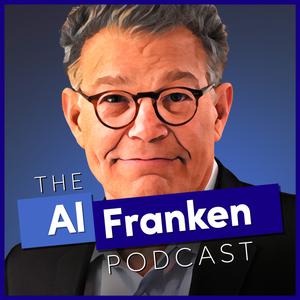
NCSL Podcasts
NCSL
Learn about the people, policies and politics of America's state legislatures with NCSL's four podcasts: "Our American States," "Legislatures: The Inside Story," "Across the Aisle" and the special limited series "Building Democracy."
- 28 minutes 5 seconds2025 Legislative Session Preview With Tim Storey | OAS Episode 226
At the start of each year, we sit down with NCSL CEO Tim Storey to discuss the most important issues facing state legislatures in the upcoming session.
While the November election did not bring big changes for state legislatures—there was minimal turnover at both the legislative and executive levels—the big change in the federal government may mean significant changes in the state-federal relationship.
State budgets, which determine much of what states can do in the new year, are stable in most states and rainy day funds generally are in good shape, Storey said. But revenues are not on the rise and, as is true at the federal level, that means less willingness by legislatures to fund new programs.
A trend of rising health care costs will also affect states through their Medicaid programs and likely result in a strong focus on controlling costs. Storey also discussed other key areas of policy, including K-12 education, social media and kids and AI. One wild card for states is immigration and how they will respond if the new administration follows through on aggressive plans for deporting people in the country without documents.
Resources
5 January 2025, 8:00 am - 38 minutes 2 secondsLooking at Nuclear Energy’s Future | OAS Episode 225
Nuclear energy plays a significant role in our national energy supply picture and is seen by some as an invaluable piece of a future clean energy system. About 20% of the nation's energy supply comes from nuclear generation at more than 90 reactors and some experts believe the nation needs another 200 gigawatts of electricity from nuclear generation in the next 25 years.
On this podcast, we spoke with Jake Kincer, a program manager at Clear Path, a center-right think tank focused on accelerating efforts to reduce global energy emissions, and with Rowen Price, a policy adviser on nuclear energy at Third Way, a center-left oriented think tank focused on a range of public policy issues.
Kincer and Price discussed how nuclear energy policy may or may not change in the transition from the Biden to the Trump administration. They explained the role nuclear energy will likely play in the coming decades as energy use soars with the added demand of data centers, AI, new industrial facilities and the electrification of the transportation fleet. They also talked about the state role, the challenge of nuclear waste, and the increasing role of private companies contracting with nuclear power providers to guarantee energy for new developments.
Resources
15 December 2024, 8:00 am - 19 minutes 24 secondsSome Friendly Advice for New Legislators | OAS Episode 224
About 1,000 new lawmakers were elected in November’s election and will be joining their legislatures in the new year. Every legislature is different, of course, but we asked two veteran legislators to offer a little advice on a few issues that likely apply in most legislatures.
Sen. Karen Keiser (D) from Washington state and Rep. Walker Thomas (R) from Kentucky shared some of their experiences as new lawmakers and advice on working with the media, responding to constituents and speaking on the floor.
Keiser, who is retiring at the end of this term, is the president pro tem of the Washington Senate and is the author of “Getting Elected Is the Easy Part: Working and Winning in the State Legislature.” She started her career in the Washington House in 1995.
Thomas has served in the Kentucky House since 2017. He is the chair of Veterans, Military Affairs and Public Protection Committee.
Resources
1 December 2024, 8:00 am - 38 minutes 17 secondsWildfire, Utilities and Mitigation Plans | OAS Episode 223
Massive wildfires in the U.S. have caused widespread damage in recent decades. The Smokehouse Creek Fire in Texas this year, the Marshall Fire in Colorado in 2021 and a series of fires in California in 2020 that were the worst in the state's history are just a few examples. Over the past few decades, the U.S. has spent more than a billion dollars annually to fight wildfires, including $3.5 billion in 2022.
In the past few years, legislators concerned about this trend have asked utilities to provide disaster mitigation plans. In Washington state last year, bipartisan legislation was enacted that requires utilities to provide wildfire mitigation plans for legislators to review.
Rep. Kristine Reeves (D) of Washington state joined the podcast to discuss the origin of the legislation in her state and why it's important for legislators to review and understand the steps utilities are taking to reduce the risk of wildfires, particularly in Western states.
Also joining the podcast was Anne Sherwood, area vice president for wildfire mitigation for Xcel Energy, a utility that operates in eight states. She explained how utilities are using wildfire mitigation plans to try to prevent wildfires and also to better manage the effect on utilities when fires do start.
17 November 2024, 8:00 am - 1 hour 5 minutesTackling Affordability and Outcomes in Higher Education | OAS Episode 222
Recent polls find that many Americans have declining confidence in higher education, in large part because of the levels of student debt, the cost of college and concerns about uneven student outcomes.
To better understand these challenges, NCSL formed a Task Force on Higher Education Affordability and Student Outcomes in 2022. The group has now issued its report. The co-chairs of the task force – Senators Ann Millner (R) of Utah and Michael Dembrow (D) of Oregon – talked with us about what they discovered. Also on the show is Austin Reid of NCSL, a federal affairs adviser in the Washington D.C., office, who worked with the task force.
Reid explained the genesis of the task force and the importance of trying to better coordinate the efforts of state government, the federal government and institutions of higher education.
Dembrow and Millner explained how the bipartisan group of legislators on the task force came to understand the importance of a degree of value. The also expressed hope that the task force’s work will lead to greater coordination between state and federal officials.
Resources
3 November 2024, 9:00 am - 28 minutes 45 secondsElection 2024: State Legislative Races and Ballot Measures | Oct. 27, 2024
On this episode, we sat down with two election experts from NCSL to discuss the state legislative races and statewide ballot measures in the Nov. 5 election.
Ben Williams, NCSL’s associate director of Elections and Redistricting, discussed the 5,508 legislative seats on ballots in 44 states, more than 78% of all legislative seats nationwide. He also explained how the outcomes could affect legislative control in the states, overall state control and veto-proof majorities in some states.
Helen Brewer with NCSL explained the range of topics covered by the more than 150 statewide ballot measures voters will decide. She discussed the large number of abortion-related measures and others uses such election administration, taxes, criminal justice and education.
Resources
27 October 2024, 7:00 am - 17 minutes 31 secondsNCSL at 50: Evolution of the Legislature | OAS Episode 220
This is one of the series of shows this year and next reflecting on the 50th anniversary of NCSL. For this episode, our focus is the legislative institution and how today’s legislatures evolved over the last 400 years.
Guests include historian Pev Squire, who sketches out how legislatures developed both from the colonial assemblies and from the territorial legislatures. We also spoke with three people who have spent considerable time in legislatures and given a great deal of thought to the institution itself— Kentucky Senate President Robert Stivers, Colorado House Speaker Julie McCluskie and Raul Burciaga, who recently retired as director of the New Mexico Legislative Council Service. They reflected on where the institution is now and the challenges it will face in the next 50 years.
Resources
20 October 2024, 7:00 am - 35 minutes 50 secondsLegislatures Focused on AI in 2024 | OAS Episode 219
Artificial intelligence, most broadly thought of as the use of computer systems to perform tasks that normally require human intelligence, is being employed in a wide array of ways, from self-driving cars to health care. But concerns about the potential misuse and unintended consequences of AI is prompting legislatures around the country to study the issue and in many cases, pass legislation.
In 2024, NCSL is tracking more than 400 pieces of legislation related to AI. This year at least 45 states, Puerto Rico, the Virgin Islands and Washington, D.C., introduced AI bills, and 31 states, Puerto Rico and the Virgin Islands adopted resolutions or enacted legislation.
Our three guests on this episode offer a look at AI’s legislative impact. Chelsea Canada from NCSL, who tracks state legislation around the country related to AI, is one of our guests and she explained the breadth of the legislation proposed in the states and also noted a trend in some states toward comprehensive AI laws focused on consumer protection.
Our other guests are Sen. Shelley Hughes (R) of Alaska, who worked this year to move a comprehensive bill through the legislature but was unsuccessful. She explained her bill and her hopes for its passage in the next session.
Our third guest is Colorado Rep. Manny Rutinel (D). He was one of the House sponsors of a successful bill focused on consumer protection and trying to remove discriminatory results from the use of AI.
Resources
- Artificial Intelligence 2024 Legislation
- Artificial Intelligence 2023 Legislation
- Artificial Intelligence 2019-2022
- Volume of AI Bills Rises, Even as Use of Systems Evolves
29 September 2024, 7:00 am - 30 minutes 5 secondsThe Debate Over Weight-Loss Drugs | OAS Episode 218
A class of drugs that are used in the treatment of type 2 diabetes and obesity are becoming increasingly popular as a weight-loss drug. However, the high cost of these GLP-1 drugs—the annual list price is around $12,000—has posed a dilemma for states as they decide whether to cover the drugs in their own state health plans, Medicaid and possibly require private insurers to cover the drugs.
On this episode, we get perspectives from three people involved in the debate: Kristen Niakan, a pharmacy management consultant with the actuarial and consulting firm Milliman; North Carolina Treasurer Dale Folwell (R); and Colorado Senator Dafna Michaelson Jenet (D).
Niakan explained the background of these drugs, who's using them, the costs involved, and the insurance coverage landscape across the country. Folwell walked through the decision in his state not to cover GLP one drugs for the state's employee health plan, and also discussed a separate decision in his state to extend coverage of the drugs to Medicaid recipients. Michaelson Jenet discussed her efforts to pass legislation that would've required all private insurance companies and the state Medicaid program in Colorado to provide coverage for the treatment of the chronic disease of obesity and the treatment of pre-diabetes, including FDA approved anti-obesity medication.
Resources
- Diabetes State Mandates and Insulin Copayment Caps, NCSL
- Employers feel the side effects of drugmaker control over Wegovy, Ozempic costs, Politico
- GLP-1 agonists in Medicaid: Utilization, growth, and management, Milliman
- Impact of anti-obesity medication coverage in the Medicaid and commercial markets
- KFF Health Tracking Poll May 2024: The Public’s Use and Views of GLP-1 Drugs, KFF
8 September 2024, 7:00 am - 21 minutes 49 secondsA Lesson in Civics | OAS Episode 217
Americans of all ages do not score well on surveys of civic knowledge. One recent survey found a large majority of respondents could not pass a basic civics literacy test and another indicated a third of respondents could not name all three branches of government. And testing of eighth graders in the U.S. and other industrialized countries also reported a decline in civics proficiency.
The vast majority of states, however, do require at least one course in civics and every state has some form of civics education. On this podcast, guest Tammy Wehrle, the legislative education and outreach officer in the Wisconsin State Legislature, talked about what she’s learned about the state of civics education.
Wehrle, who was a classroom educator and holds a doctorate, oversees a variety of programs in the legislature that can involve kids as young as 12. She thinks there is real value in young people seeing the legislature from the inside and understanding the range of roles necessary to run the legislature.
Resources
- Civics Education at NCSL
- Senate Scholar Program, Wisconsin State Legislature
- Staff Snapshots | Tammy Wehrle, NCSL
18 August 2024, 7:00 am - 18 minutesNCSL Turns 50 | OAS Episode 216
This podcast is the first of several to observe the 50th anniversary of NCSL. The organization has been an integral part of the change in state legislations over the last half century. NCSL provides research to the states on myriad public policy topics, offers a unified voice in Washington where it lobbies on behalf of the states, and serves as a convener of scores of meetings every year in person and virtually to help legislators and legislative staff from across the nation share ideas and solutions. On this episode we track the development of legislatures over the last 400 years and talk with a range of guests about the role of legislatures in the jigsaw puzzle of American governance.
Our guests include political scientist Don Kettl; former NCSL staffer Karl Kurtz; Sabrina Lewellen, assistant secretary of the Arkansas Senate and current staff chair at NCSL; Bill Pound, longtime NCSL executive director; historian Pev Squire, former NCSL staffer Brian Weberg; and Natalie Wood, NCSL’s vice president of policy and research.
4 August 2024, 7:00 am - More Episodes? Get the App
Your feedback is valuable to us. Should you encounter any bugs, glitches, lack of functionality or other problems, please email us on [email protected] or join Moon.FM Telegram Group where you can talk directly to the dev team who are happy to answer any queries.
 Hidden Brain
Hidden Brain
 The NPR Politics Podcast
The NPR Politics Podcast
 Stay Tuned with Preet
Stay Tuned with Preet
 Throughline
Throughline
 The Al Franken Podcast
The Al Franken Podcast
 Hacks On Tap
Hacks On Tap